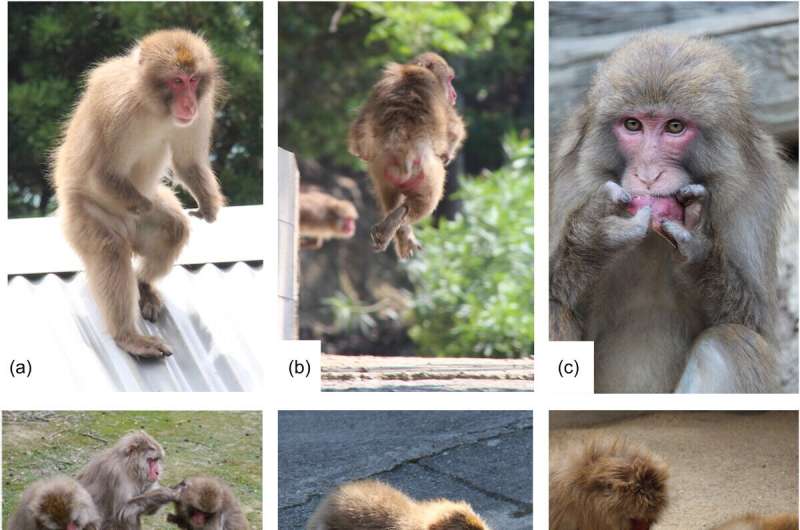This article has been reviewed according to Science X's editorial process and policies. Editors have highlighted the following attributes while ensuring the content's credibility:
fact-checked
trusted source
proofread
Physically impaired primates find ways to modify their behaviors to compensate for disabilities, find researchers

Primates show a remarkable ability to modify their behaviors to accommodate their physical disabilities and impairments according to a new literature review by Concordia researchers.
Whether the disabilities were the result of congenital malformations or injuries, many primate species exhibited behavioral flexibility and innovation to compensate for their disabilities. They also benefitted from flexible and innovative behavior by their mothers early in life and from their peers within their population group as they aged.
Researchers at the Primatology and Interdisciplinary Environmental Studies (PIES) Lab looked at 114 studies and published their findings in the American Journal of Primatology.
The survey also revealed something the researchers had not anticipated.
"Brogan Stewart, a Ph.D. candidate, and the paper's lead author, noticed that a high proportion of the papers mentioned a connection to human activity as a potential or actual cause of impairment," says co-corresponding author Sarah Turner, an associate professor in the Department of Geography, Planning, and Environment in the Faculty of Arts and Science.
"The disabilities may be the result of primates being caught in snares intended for other animals or farmers trying to deter crop foraging. Perhaps they are the result of vehicle collision, or sometimes there are links between a small population's genetics and the impairments or diseases transmitted from people or contaminants in the environment."
The studies consulted dated between 1931 and 2023 and identified 125 species. Chimpanzees were the most frequently studied, accounting for 25 percent of the articles. Other frequently identified species included Japanese macaques, Rhesus macaques, Crab-eating macaques, and Olive baboons.
More than 90 percent of the disabilities were identified as malformations, injuries, or illnesses or conditions. Macaques were the subjects of the highest number of studies on malformations, while chimpanzees had the highest number of studies on injuries and illnesses or conditions.
The researchers identified three themes in the literature they surveyed:
- The central role of behavioral flexibility: despite being physically impaired or disabled, the primates were able to adjust their species-typical behaviors to survive, reproduce, and thrive. For instance, some chimpanzees were observed using two or three limbs for locomotion instead of their usual four.
- The importance of maternal and conspecific care and the social environment: while all primates need their mothers early in life, mothers of babies with disabilities will provide additional care and modify their own behavior depending on their offspring's needs. Similarly, others in their group will sometimes modify their own species-typical care to help a disabled co-member. For example, an adult male Japanese macaque adopted a young orphaned disabled monkey and carried her while he moved on three limbs when the group traveled.
- The potential for innovation: Disabled primates were seen developing new ways to participate in grooming, carrying their offspring, and feeding. These usually involved new ways to use their limbs, such as pinching branches with their forearms against their torsos to eat.
For Turner and her team, the findings open new avenues of research and provide valuable insights into the primates' adaptative capabilities, their resilience, and the many unexpected repercussions human activity can have on non-human animals.
"Some of the individuals at the Awajishima Monkey Center, where we do our fieldwork, have extensive physical impairments, but they are leading their lives and doing the things the other monkeys do," Turner says. "They find ways to modify their behaviors like unique styles of movement, ways of carrying their infants, techniques for foraging and feeding and individual styles of social grooming—to compensate for physical impairments."
Stewart adds, "We are left to wonder if there is a cost to them to having physical impairments. And when they are compensating for them, is there a cost to that? I'm doing my Ph.D. research on the complexity of behavioral patterns associated with Japanese macaques having physical impairments. Hopefully, this research will give us more insight into the consequences of disability for free-ranging and wild primates."
More information: Brogan M. Stewart et al, Primates and disability: Behavioral flexibility and implications for resilience to environmental change, American Journal of Primatology (2023). DOI: 10.1002/ajp.23579
Provided by Concordia University


















